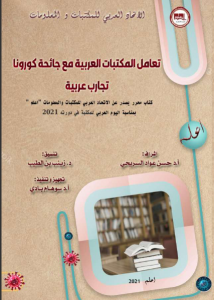The Arab Federation for Libraries and Information (AFLI) announced recently the launching of its new book entitled “Arab Libraries Dealing with the Corona Pandemic: Arab Experiences”.
The book was issued on the occasion of the “Arab Library Day 2021” to gather the efforts of libraries and institutions that show how the Arab libraries interact & provide their services to the beneficiaries to ensure the continuation of their services during the pandemic, and to document the repercussions and lessons learned during this period.
The book is available in Arabic language on AFLI website at: https://bit.ly/3nrYycj
The book discusses the following topics:
- Arab libraries and their experiences during the Corona pandemic: case studies; how the library dealt with the pandemic, plans, lessons learned, services, future plans.
- Arab libraries and future plans to deal with unexpected crises
- Crisis management and activating its role in Arab libraries and information institutions.
- The technical and physical infrastructure of Arab libraries of all kinds and their readiness to serve their beneficiaries in light of unexpected crises
- Library and information specialists and how to perform their tasks in light of the pandemic: reality and challenges
Cover of the book
This book aims to clarify:
- The Arab contribution to documenting the efforts of Arab libraries of all kinds, as well as their professionals, in dealing with the unprecedented Corona pandemic.
- Uncovering the ways and mechanisms of participation/contribution of various Arab libraries with this pandemic and its unusual repercussions.
- Shedding light on the methodologies for adapting Arab libraries to this circumstance.
- Standing on the contribution of Arab libraries to raising awareness of ways to prevent infection and the spread of the epidemic.
- Shedding light on the most important types of information services and activities provided by Arab libraries during the pandemic since its inception until today.
- Show the readiness of Arab libraries, with their technical infrastructure, and their material and human capabilities, for such unprecedented crisis.
- To identify how Arab libraries have responded to the changes required to deal with this pandemic.
It is worth mentioning that the contributors of the book are:
Algeria (Algeria National Library; Faculty of economic and business sciences, management Library at Batna University; Public library “Mohamed Hammouda bin Saei” in Batna state);
Egypt (Bibliotheca Alexandrina; Misr Public Library; Egypt’s Society for Culture and Development);
Iraq (Iraq National Library and Archive);
Jordan (Abdul Hameed Shoman Foundation library).
Oman (Main Library at Sultan Qaboos University; Learning Resource Center at Saeed Bin Jubair primary School).
Palestine (Library of Dar Al-Kalima University College of Arts and Culture Library; Nablus Municipality Public Libraries).
Saudi Arabia (King Saud University Libraries; Deanship of Library Affairs at King Abdulaziz University).
Sudan (The Sudanese National Library).
United Arab Emirates (Sharjah Public Libraries).
The book also demonstrated a model for the YouTube channel dedicated to librarians and its impact on society.
The book concluded the experiments presented with the lessons learned and a guideline for opening libraries after the COVID- 19 pandemic.
